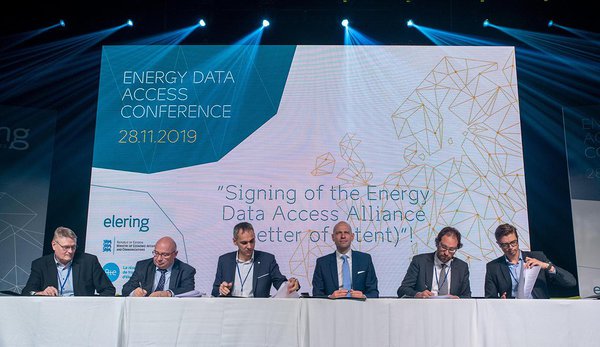SOFIE is on the right track towards creating a greener Europe
Europe has set ambitious energy and climate goals. Today energy services markets are highly fragmented, due to differences in regulation and data access, which prevents the spread of energy retail, efficiency and flexibility solutions around Europe. These barriers need to be battled through, in order to achieve the dream of a greener and carbon neutral Europe.
In 2019 we saw several important breakthroughs, both in Europe and globally, in energy data exchange field that take serious steps in that battle. Those efforts are aligned with SOFIE’s vision, that imagines and works for a future where the energy market is decentralized. Thus, this blog will take a look at these break-throughs and will reflect on how the SOFIE solution goes hand in hand with them.
Brave new steps in policy
There are two essential pillars that need to stand strong if we want any software development to improve the energy market situation and enhance its sustainable nature - 1) a transparent governance mechanisms and 2) concrete political action to start using new technologies. Instead of country specific jurisdiction that limits cross-border energy data decentralization process, a unifying roof needs to be built to facilitate the free movement of energy data.
This has been realized by European energy market key players who have stepped into real action. Namely, led by Elering (Estonian TSO), grid operators from Estonia, Spain, France, Denmark, Finland, Poland, Lithuania, the Netherlands have signed a Letter of Intent to form the Energy Data Access Alliance that will make Europe’s energy data interoperable, with the purpose that energy companies can securely access this data and operate in any European country without barriers. This a huge step in pan-European cooperation, to complete the mission of truly free energy data. This Alliance aims to achieve retail market integration with shared tools and methods for consent-based data access and sending market messages. There will be no super-hub, data moves directly between parties. With this it ensures that homes and businesses have the best services and affordable green energy.
This breakthrough and joint understanding on the European level means that already in 2020 all European countries will have the possibility to use the same concept (supported by existing and new standards) to provide access to energy data for flexibility services. With SOFIE we can fill the cap in this concept from the technology’s side enabling authorization, access to data and security. SOFIE offers seamless access to data with a few clicks done by the data owner (the citizen), regardless of where the person lives or what existing energy networks are in place. The energy industry is invited to actively contribute to the formation and further work of the Alliance.
“Achieving Europe’s energy and climate goals is Elering’s aim,'' said Georg Rute, Head of Smart Grid Unit in Elering. “The Alliance will make life easier for energy companies to enter new markets, thus increasing competition and resulting in more efficiency and flexibility on the grid. We are looking forward to onboarding energy sector players during the upcoming year. We expect energy grid operators, industry and EU projects such as SOFIE to be actively involved and make the Alliance a reality.”
SOFIE through Guardtime’s representative is definitely taking this chance and will be ready with it’s offer when the Alliance is officially formed and a governance structure for free energy data will be launched.
The determined steps of technology
Technology and innovation has not been standing still. There have been several technological breakthroughs from basic technology components to novel new technology (e.g. blockchains and distributed ledgers) to accelerate energy transition and market flexibility. For example The Energy Web Foundation (EWF) recently announced a major evolution of its technology roadmap to enhance energy transition in improving energy sector traceability and unlocking grid flexibility from customer-owned resources. This is the kind of solution that SOFIE aims to achieve, as well. We have the following common understanding to solve the energy data centralization and access problem. We both aim to use:
self-sovereign decentralized identifiers;
an architecture approach for multiple decentralized registries;
massively scalable messaging services;
and easy integrations with existing DSO/TSO IT systems.
The use of these tools and methods make the mission to transfer the control of energy data to the owner a reality. The EWF has carried out extensive experimenting and prototyping and has, in the general sense, reached the same conclusions for solving energy data exchange problem as has SOFIE. This proves that the SOFIE solution is sound. The toolkits of EWF and SOFIE are similar by nature. Nevertheless, the playfield is large and full of specific challenges and various ways of solving them. It will be interesting to follow, how one and the other uses their tools in the market in the future.
Regulations need runners steps
In addition to political and technological breakthroughs, the EU regulations and standards are also catching up in the race towards a greener future. For example CEN-CENELEC, responsible for European standardization in the area of electrical engineering, is forming a “CEN-CLC/JTC on Blockchain and distributed ledger technology” committee and preparing a whitepaper for energy data exchange. This initiative gives directions to the technology sector in connection to standards and technological components needed to be developed in order to contribute to the reduction of CO2 emissions, energy efficiency and free flow and access of services. In practical terms this is related to what will the next generation smart meters look like, how the authorization and access control is solved and security frameworks handled. All and all, the aims is to create common rules to reach a sustainable energy production. SOFIE through Guardtime is providing it’s input per request to this initiative and can propose adding SOFIE adapters concept to the technical guide.
Additionally, in cooperation with different EU H2020 projects a “Bridge report” for data management, cybersecurity and resilience is finalized and will be published in 2020. This report unites the knowhow of various H2020 energy sector projects and creates a common understanding on how to tackle the problems of energy data management, privacy and security. Here SOFIE too, through Guardtime, has been involved in the preparation process of the report. For example SOFIE has helped to map the common and country specific problems in energy data exchange and made suggestions on how to solve them. These efforts and cooperation between EU projects is important for SOFIE to be able to deliver better conclusions of the future exploitation of SOFIE results. Both the Bridge report as well as the Cen Cenelec initiative help to form a common voice on the European arena to represent energy sector.
In conclusion, energy data access remains to be a complex topic that needs to be approached in a comprehensive manner on technical but also on socio-political aspects. The breakthroughs highlighted in this blog are just a few examples of joint efforts made to assure that the current reality of centralized energy market will be completely reversed in a few years. SOFIE is definitely on the right track with it’s ambitions and keeps moving forward.
This blog post has used the following sources:
- Grid operators to establish Energy Data Access Alliance to revolutionise European energy market, 28.11.2019, press release by Elering.
- Energy Web Foundation Announces New Technology Roadmap Focused on ‘Decentralized Operating System’ to Accelerate the Energy Transition, 11.12.2019, news release by EWF.
For additional reading:

